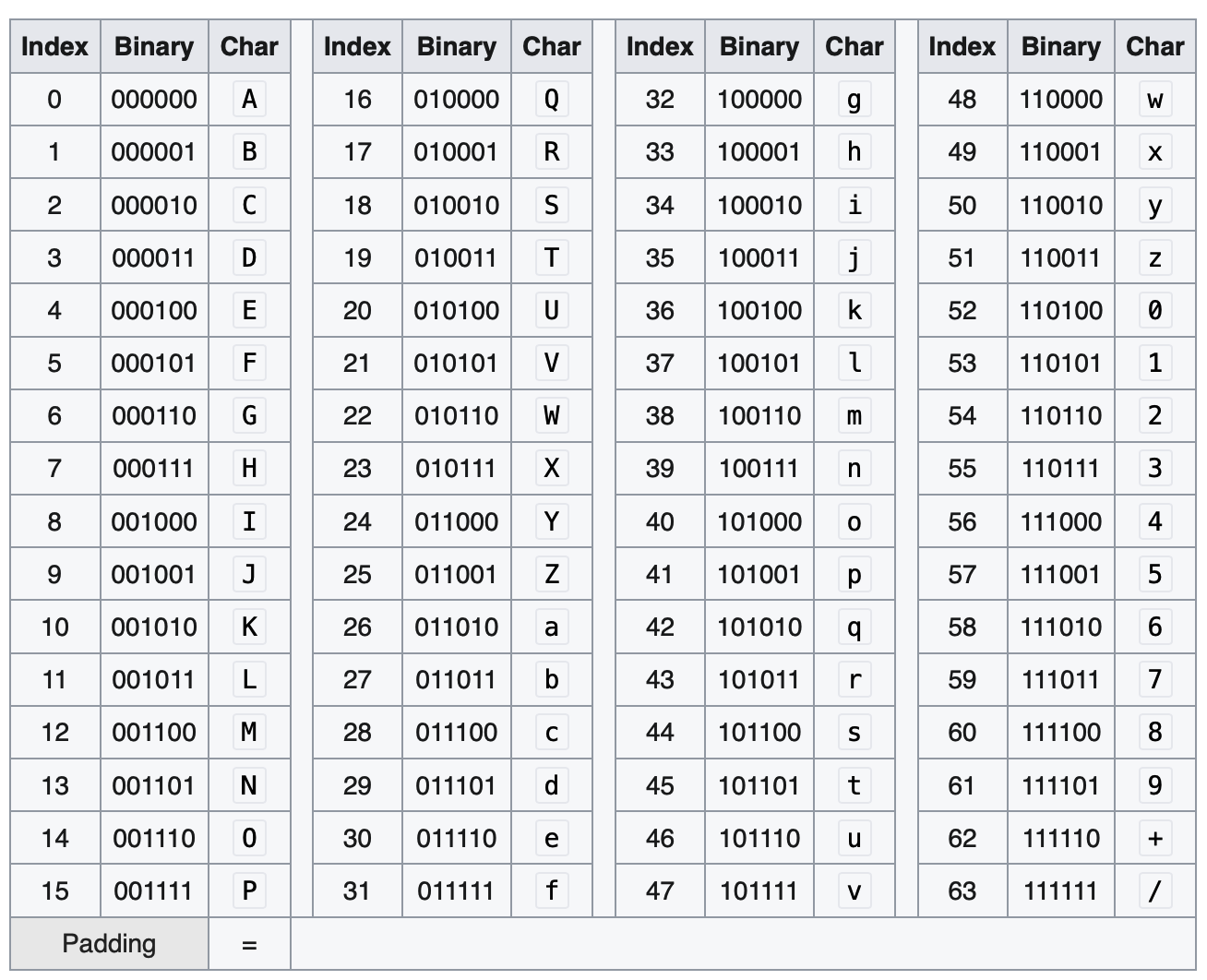Base64 encode and decode are used in many places. What is base64 and how to implement base64 encode and decode in python?
- What is base64?
- How to encode bytes into base64 in python?
- How to decode a base64 encoded string?
- Thoughts
What is base64?
Wikipedia says it is a binary to text encodidng method. Base64, like a decimal system on base 10, is based on 64.
6 digits is used to represent a number from 0-63. So basically in base64, it uses 4 characters to represent 3 bytes. The memory increase will be more than 33% (allowing for padding).
Following is a picture of the base64 number and its corresponding characters.

So in summary:
- It is a system based on 64
- 4 characters to represent 3 bytes, memory increase will be at least 33%
How to encode bytes into base64 in python?
Python standard library
import base64
content = b"Man"
result = base64.b64encode(content)
print(result.decode("utf-8"))
# "TWFu"
Make your hands dirty
import base64
def base64_code_book():
code_book = {}
A = ord("A")
Z = ord("Z")
a = ord("a")
z = ord("z")
zero = ord("0")
nine = ord("9")
Cur = 0
N = Z - A + 1
code_book.update((n, chr(c)) for n, c in zip(range(Cur, Cur+N+1), range(A, Z+1)))
Cur += N
N = z - a + 1
code_book.update((n, chr(c)) for n, c in zip(range(Cur, Cur+N+1), range(a, z+1)))
Cur += N
N = nine - zero + 1
code_book.update(
(n, chr(c)) for n, c in zip(range(Cur, Cur+N+1), range(zero, nine+1))
)
code_book[62] = "+"
code_book[63] = "/"
padding = "="
return code_book, padding
def b64encode(content):
binary = ""
code_book, padding = base64_code_book()
_ = padding
for c in content:
b = f"{c:08b}"
binary += b
print(binary)
size = len(binary)
step = 24
result = ""
for start in range(0, size, step):
end = min(start+step, size)
diff = end - start
if diff < 24:
# Padding needed here
if diff < 10:
# one byte, padding 2
result += code_book[int(binary[start : start+6], base=2)]
result += code_book[int(binary[start+6:]+"0000", base=2)]
result += padding
result += padding
else:
# two byte, padding one
result += code_book[int(binary[start : start+6], base=2)]
result += code_book[int(binary[start+6 : start+12], base=2)]
result += code_book[int(binary[start+12:]+"00", base=2)]
result += padding
else:
for _ in range(0, 24, 6):
result += code_book[int(binary[_+start : _+start+6], base=2)]
return result.encode("utf-8")
content = b"Man"
res1 = b64encode(content)
res2 = base64.b64encode(content)
print(f"{res1}")
print(f"{res2}")
print(f"{res1==res2}")
content = b"Many hands make light wor"
res1 = b64encode(content)
res2 = base64.b64encode(content)
print(f"{res1}")
print(f"{res2}")
print(f"{res1==res2}")
- I dont know why
base64.b64encodereturns type ofbytes?
How to decode a base64 encoded string?
Python standard library
import base64
b = b"TWFu"
res = base64.b64decode(b)
print(res.decode("utf-8")
Make your hands dirty again
def b64decode(content):
content = content.decode("utf-8")
size = len(content)
print(content)
code_book, padding = base64_code_book()
reverse_code_book = dict((v, k) for k, v in code_book.items())
step = 4
binary = ""
for start in range(0, size, step):
end = start + 4
shift = 0
while content[end-1] == padding:
shift += 1
end -= 1
temp = ""
for c in content[start:end]:
v = reverse_code_book[c]
temp += f"{v:06b}"
if shift != 0:
binary += temp[:-shift*2]
else:
binary += temp
step = 8
size = len(binary)
print(f"Binary: {binary}")
result = b""
for start in range(0, size, step):
result += int(binary[start:start+8], base=2).to_bytes(1, byteorder=sys.byteorder)
return result
content = b"Man"
print(b64decode(b64encode(content)))
Please refer to previous paragraph for the definition of
b64encode
Thoughts
Convert from ascii and int
In cpp, the language allows us to directly do mathematical operations between char
and int. In python, we can not.
chr and ord can be used to convert between char and int.
b = ord('a')
a = chr(b)
Convert an int to binary representation
Python provides function like bin, oct and hex to convert from a int to its corresponding
format. What if we want to control the length of the binary representation?
a = 3
b = bin(a) # 0b101
c = b[2:].rjust(8, '0') # c = b[2:].zfill(8) # only fill zero
d = b[2:].ljust(8, '0')
e = f"{a:0>6b}"
f = f"{a:0<6b}"
g = f"{a:0^6b}" # Fill left and right
Int to bytes
a = 3
length = 1
print(int.to_bytes(1, a))
### bytes array